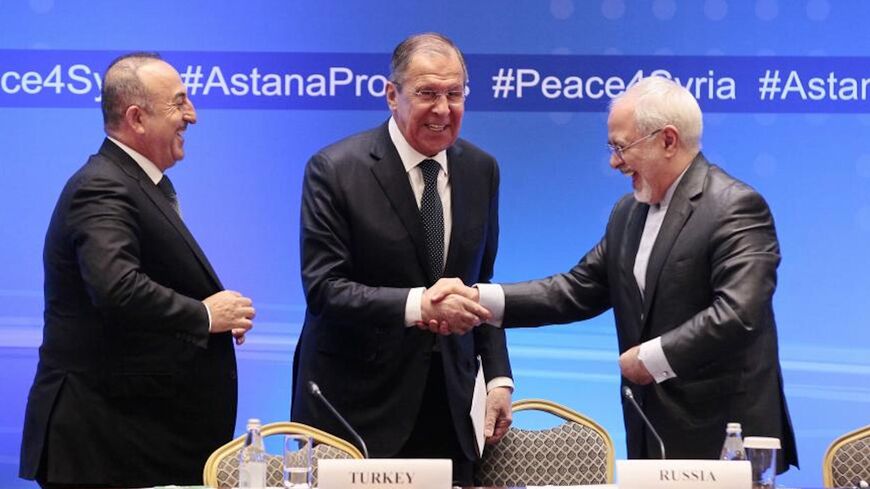Talks between the assistant foreign ministers of Syria, Russia, Iran and Turkey kicked off in Moscow Tuesday in the presence of Russia’s top diplomat, Sergey Lavrov, as part of a Kremlin-led effort to reconcile Ankara and Damascus.
The outcome of the talks remained unclear as of the time of publication of this article. Syria’s President Bashar al-Assad has made peace with Ankara conditional on the withdrawal of Turkish troops from large swathes of northern Syria, parts of which Turkey jointly administers with its Sunni rebel allies. Turkey also has troops in Idlib, which is under the control of al-Qaeda offshoot Hayat Tahrir Sham, in line with the Astana Accords signed with Russia and Iran.
Assad is known to be reluctant to make up with Turkey’s President Recep Tayyip Erdogan, who for years supported Sunni rebels seeking to bloodily overthrow him until Russia intervened in Syria in 2015 and forced Ankara to ditch its regime change plans.
His views were reiterated by the head of the Syrian delegation, Assistant Foreign and Expatriates Minister Ayman Sousan, who was quoted ahead of Tuesday's meeting by Syria’s official news agency, SANA, saying that Turkey's formal and unequivocal announcement that it would withdraw all its forces is “the gateway to re-establish communication between the two sides.”
The plan initially was for the foreign ministers to meet, as indicated by Turkey’s Foreign Minister Mevlut Cavusoglu, who said he could meet with his Syrian counterpart Faisal Mekdad early in February.
An earlier meeting between Turkish and Syrian defense ministers and intelligence chiefs in December marked the highest-level meeting between the sides since the start of Syria’s civil conflict in 2011.
It is typical for foreign ministers to lay the groundwork for a summit between their respective countries' leaders. That is what Vladimir Putin is aiming for, in part to give Erdogan — a perceived ally — a boost ahead of landmark elections on May 14. Some polls suggest the opposition has a shot of toppling him at the ballot box for the first time in two decades due to a sharp economic downturn that is fueling anti-racist sentiments against some 3.7 million Syrian refugees. The opposition has promised to send them home.
Assad has reason to be confident. After years of diplomatic isolation, Arab countries are mending ties with Damascus. And Saudi Arabia, which bankrolled the Sunni rebels, looks like it's about to take the leap as well, with expectations growing that Assad will be invited to the forthcoming Arab League Summit to be held next month in Riyadh.
The United Arab Emirates is known to be playing a key role in that effort while mediating between Ankara and Damascus as well. One of the arguments being advanced is that normalizing ties with Assad’s bloodstained regime will help reduce Iran’s huge influence.
Indeed, the initial setting proposed by Moscow included the UAE foreign minister but not the Iranian one, which is why Tuesday’s meeting, which was originally meant to be held in mid-March, was canceled at the time following Iran’s objections. “Dissatisfied with being sidelined in such an important diplomatic file, Tehran put pressure on Damascus to postpone the meeting. At the same time, Iran reached out directly to Moscow and Ankara on this issue,” said Hamidreza Azizi, a visiting fellow at the German Institute for International and Security Affairs in Berlin.
In principle, Iran is not opposed to rapprochement between Damascus and Turkey and/or with Syria’s fellow Arab governments. But it does not want this to come at the expense of its own influence. “Iran’s support for the Turkish-Syrian normalization is conditional on Iranian involvement in the process,” Azizi said.
With Russia growing increasingly dependent on Iranian drones in its war on Ukraine, the Kremlin changed tack. The UAE was dropped from the talks and Iran was brought in. However, the low level of representation in today’s talks suggests that “Russia’s expectations have not been fully met,” Azizi contended.
A common concern for Iran and Arab governments and the United States is to prevent further Turkish expansion in Syria. Turkey has long threatened to carry out further large-scale military operations against US-backed Kurdish forces in northeast Syria. Peace between Ankara and Damascus would, they reckon, reduce the risk of another Turkish invasion.








